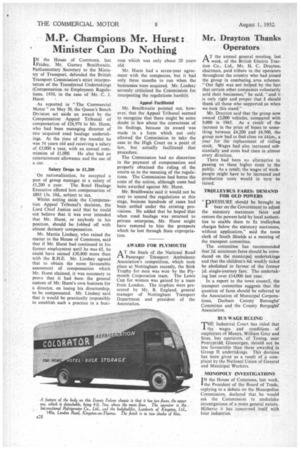M.P. Champions Mr. Hurst: Minister Can Do Nothing
Page 30

If you've noticed an error in this article please click here to report it so we can fix it.
I N the House of Commons, last .Friday, Mr. Gurney Braithwaite, Parliamentary Secretary to the Ministry of Transport, defended the British Transport Commission's strict interpretation of the Transferred Undertakings (Compensation to Employees) Regulations, 1950, in the case of Mr. C. J. Horst.
As reported in "The Commercial Motor" on May 30, the Queen's Bench Division set aside an award by the Compensation Appeal Tribunal of compensation of £26,976 to Mr. Hurst, who had been managing director of two acquired road haulage undertakings. At the time of the transfer he was 54 years old and receiving a salary of £3,000 a year, with an annual commission of £1,000. He also had an entertainment allowance and the use of a car.
Salary Drops to £1,200 On nationalization, he accepted a post of group manager at a salary of £1,200 a year. The Road Haulage Executive offered him compensation of £803 13s. 10d., subject to tax. • Whilst setting aside the Compensation Appeal Tribunal's decision, the Lord Chief Justice said that he could not believe that it was ever intended that Mr. Hurst, or anybody in his position, should be fobbed off with almost derisory compensation.
Mr. Martin Lindsay, who raised the matter in the House of Commons, said that if Mr. Hurst had continued in his former employirient until he was 65, he could have earned £30,800 more than with the R.H.E. Mr. Lindsay agreed that to obtain the more favourable assessment of compensation which Mr. Hurst claimed, it was necessary to prove that it had been the general custom of Mr. Hurst's own business for a director, on losing his directorship. to be compensated. Mr. Lindsay said that it would be practically impossible to establish such a practice in a busi
ness which was only about 20 years old: Mr. Hurst had a seven-year agreement with the companies, but it had only three months to run when the businesses were acquired. Mr. Lindsay severely criticized the Commission for interpreting the regulations harshly.
Appeal Facilitated Mr. Braithwaite pointed out, however, that the' Appeal Tribunal seemed to recognize that there might be some doubt in law about the correctness of its findings, because its award was made in a form which not only allowed the Commission to take the case to the High Court on a point of law, but actually facilitated that procedure.
The Commission had no discretion in the payment of compensation and properly obtained the ruling of the courts as to the meaning of the regulations. The Commission had borne the costs of the action, although costs had been awarded against Mr. Hurst.
Mr. Braithwaite said it would not be easy to amend the regulations at this stage, because hundreds of cases had been settled under the existing provisions. He added that he hoped that when road haulage was returned to private enterprise, Mr. Hurst might have restored to him the prospects which he lost through State expropriation.
AWARD FOR PLYMOUTH
AT the finals of the National Road Passenger Transport Ambulance Association's competition, which took place at Nottingham recently, the Stirk Trophy for men was won by the Plymouth Corporation team. The Lewis Cup for women was gained by a team from London. The trophies were presented by Mr. B. England, general manager of Nottingham Transport Department and president of the Association.




















































































